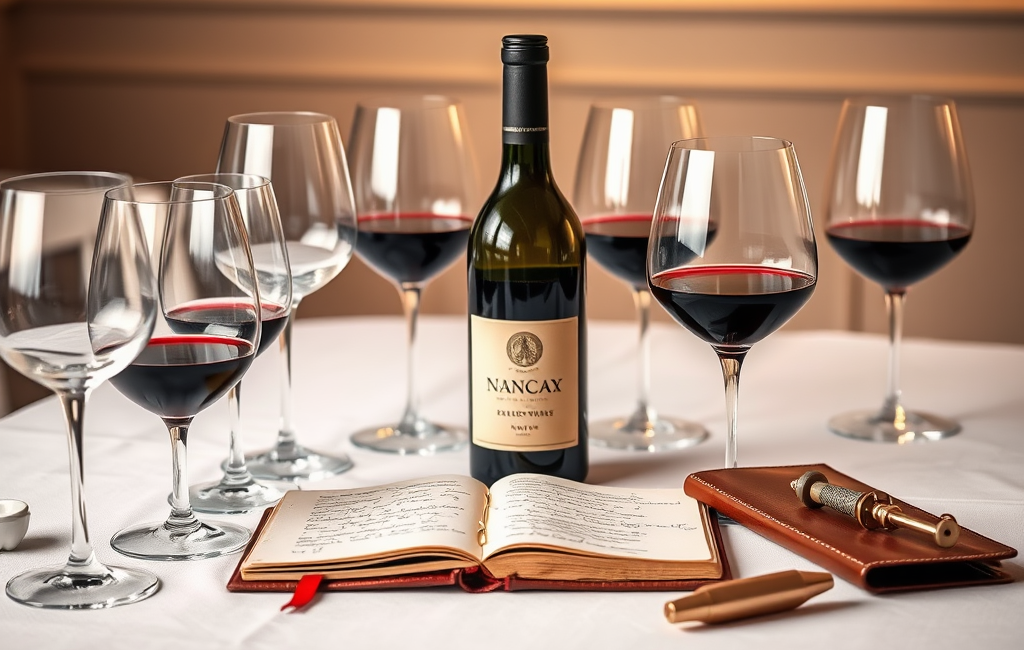This post may contains affiliate links. Read our full disclosure here.
Ever wondered what it takes to transform your casual wine passion into a professional career? Learning how to become a certified sommelier might just be the perfect path for you! The journey from wine enthusiast to certified wine professional is both challenging and incredibly rewarding. In 2025, the sommelier profession continues to grow, offering exciting opportunities in restaurants, hotels, retail, and beyond. This guide will help you navigate the process of how to become a certified sommelier successfully.
Becoming a certified sommelier requires dedication, studying, and hands-on practice, but don’t let that intimidate you. The wine world welcomes passionate learners of all backgrounds. Whether you’re already working in hospitality or looking to change careers entirely, sommelier certification provides structured education and credentials that open doors throughout the wine industry.
Understanding how to become a certified sommelier involves exploring different certification paths and programs available in the industry.

What Is a Certified Sommelier?
A certified sommelier is much more than someone who simply enjoys wine. These professionals have completed formal educational programs and passed rigorous exams that test their knowledge and skills. While anyone can call themselves a “sommelier,” certification provides industry-recognized validation of your expertise.
To truly excel, it’s essential to delve deeply into how to become a certified sommelier and understand the nuances of wine appreciation and service.
Certified sommeliers possess specialized training in multiple areas that casual wine enthusiasts typically don’t. They understand the intricate details of wine classification systems worldwide, proper service techniques, food and wine pairings, wine storage requirements, and the ability to identify wines through blind tasting.
The professional responsibilities of a certified sommelier typically include curating wine lists, training service staff, managing inventory, conducting tastings, and providing personalized recommendations to customers. They might work in fine dining establishments, hotels, wine shops, or as independent consultants.

Each program offers a unique perspective on how to become a certified sommelier, so choose one that aligns with your goals.
In learning how to become a certified sommelier, practical experience is invaluable, especially in customer-focused environments.
Top Sommelier Certification Programs
When exploring how to become a certified sommelier, you’ll discover several paths to certification. Two major organizations dominate the wine certification landscape, each with their own approach and focus.
Court of Master Sommeliers (CMS)
The Court of Master Sommeliers focuses heavily on service excellence and practical application. Their program is ideal for restaurant professionals and others who want to work directly with customers. The CMS certification path includes four progressive levels:
- Introductory Sommelier – Covers wine basics, service fundamentals, and spirits knowledge
- Certified Sommelier – Tests advanced theory, blind tasting skills, and practical service
- Advanced Sommelier – Requires deep regional knowledge and refined service techniques
- Master Sommelier – The elite pinnacle achieved by fewer than 300 people worldwide
The CMS program is renowned for its rigorous blind tasting components and emphasis on proper service standards. Their certification is particularly valued in hospitality settings. For detailed information about their requirements, visit the CMS Certification website.
Wine & Spirit Education Trust (WSET)
If you’re wondering how to become a certified sommelier with a more academic approach, WSET might be your ideal path. This globally recognized program focuses on wine knowledge and theory, making it excellent for those interested in wine education, purchasing, or marketing roles.
WSET offers a robust structure for those focused on how to become a certified sommelier through academic study.
- Level 1 Award in Wines – Foundation course covering wine basics and food pairings
- Level 2 Award in Wines – Explores major grape varieties and wine regions
- Level 3 Award in Wines – In-depth study of global wines with detailed tasting methodology
- Level 4 Diploma in Wines – Comprehensive professional qualification (often takes 2+ years)
WSET’s structured curriculum appeals to many learners with its clear progression and systematic tasting approach. Their qualifications are respected worldwide in various wine industry sectors. Explore the full WSET qualification details on their official site.

Other Reputable Sommelier Programs
Beyond the two main certification bodies, several other programs offer valuable sommelier courses and credentials worth considering:
The International Sommelier Guild provides hands-on training with a practical approach to wine education. Their programs are particularly strong for those already working in the hospitality industry who want to advance their careers with recognized credentials.
Another excellent option is the Sommelier Society of America, which offers U.S.-focused wine education with a comprehensive curriculum. Founded in 1954, it’s America’s oldest wine teaching organization and provides both in-person and sommelier classes online.
When considering how to become a certified sommelier, factor in the time, cost, and commitment each program demands.
For those interested in specific wine regions, consider specialized programs like the Italian Wine Scholar or French Wine Scholar programs offered through the Wine Scholar Guild. These focused certifications can complement broader sommelier training.
Those embarking on how to become a certified sommelier should embrace the learning journey and the unique experiences it offers.

How to Choose the Best Sommelier Program
Selecting the right certification path is a crucial step in how to become a certified sommelier. Your choice should align with your specific career goals and learning preferences.
Consider these factors when selecting among the best sommelier programs:
Your journey on how to become a certified sommelier will also involve developing a unique personal style in wine service.
- Career aspirations – CMS for restaurant/service careers, WSET for wine business, education, or marketing roles
- Learning style – WSET offers more self-paced options, while CMS typically involves intensive in-person components
- Budget constraints – Programs range from several hundred to several thousand dollars
- Time availability – Consider whether you need flexibility or prefer structured class schedules
- Location – Some programs require in-person attendance, while others offer online options
Many successful sommeliers combine certificates from different organizations to build a comprehensive knowledge base. You might start with WSET Levels 1-2 for foundational knowledge, then pursue CMS certification for service expertise if you aim to work in restaurant settings.
Remember that how long it takes to become a sommelier varies significantly based on your chosen path. Reaching certified status can take anywhere from 6 months to several years of dedicated study and practice. The journey to becoming a skilled sommelier isn’t just about passing exams—it’s about developing your palate through continuous learning.

Study Tips for the Sommelier Exam
Preparing for certified sommelier requirements demands dedication and smart study strategies. Here are proven techniques to help you succeed:
- Join a tasting group – Regular practice with peers improves your blind tasting skills dramatically. Meeting weekly to taste and discuss wines creates accountability and exposes you to diverse wine styles.
- Get hands-on experience – Working in a restaurant, wine bar, or retail shop provides practical knowledge that’s impossible to gain from books alone. Even a part-time position offers valuable exposure to different wines.
- Create a structured study plan – Break down the massive amount of information into manageable sections. Focus on one wine region or concept at a time rather than trying to memorize everything at once.
- Use flashcards and maps – Visual aids are incredibly helpful for memorizing wine regions, grape varieties, and classification systems. Digital flashcard apps allow you to study anywhere.
- Practice proper service techniques – For CMS certifications, perfect your wine service skills including opening, decanting, and pouring. Practice with friends until these movements become second nature.
As you proceed in how to become a certified sommelier, know that your commitment will enhance your expertise and open up new avenues.
Mastering the technical language of wine evaluation is essential. Practice describing wines using the proper terminology as outlined in wine tasting terminology guides. Record detailed tasting notes for every wine you sample—this creates a personal reference library and trains your palate.
Don’t underestimate the sommelier exam tips shared by those who’ve succeeded before you. Many certified sommeliers share their study techniques through blogs, podcasts, and social media. Following their advice can save you countless hours of inefficient studying.
Time and Cost Investment for Sommelier Certification
Preparation for how to become a certified sommelier requires both practical experience and theoretical knowledge to succeed.
Understanding the financial and time commitments is crucial when planning how to become a certified sommelier. Here’s a breakdown of what to expect in 2025:
- CMS Introductory Course & Exam – $700-$800, requiring 3-6 months of preparation
- CMS Certified Sommelier Exam – Approximately $600, with most candidates studying 6-12 months
- WSET Level 2 Award in Wines – $800-$1,200 including classes and exam, typically completed in 2-3 months
- WSET Level 3 Award in Wines – $1,200-$1,800, requiring 3-6 months of dedicated study
- WSET Level 4 Diploma – $7,000-$10,000+ over 2-3 years
Beyond tuition and exam fees, budget for additional expenses like tasting wines (which adds up quickly!), books, study materials, and possibly travel costs to exam locations. Many candidates spend $50-$100 weekly on practice wines alone during intensive study periods.
Time investment varies based on your background knowledge and study intensity. Those already working in the wine industry often progress faster than complete beginners. Many successful candidates dedicate 10-20 hours weekly to studying, tasting, and practicing service skills.
Look for financial assistance through wine education programs that offer scholarships. Organizations like the Napa Valley Vintners and Wine & Spirits Wholesalers of America Foundation provide funding opportunities for aspiring wine professionals.
Career Opportunities After Certification
Once you’ve completed your journey in how to become a certified sommelier, numerous career paths await. Your certification can open doors to roles including:
- Restaurant Sommelier – Working in fine dining creating wine lists and guiding guests
- Hotel Beverage Director – Managing wine and spirits programs across multiple outlets
- Wine Buyer – Selecting bottles for retail shops or restaurant groups
- Wine Educator – Teaching classes and leading tastings for consumers or professionals
- Wine Marketing Professional – Representing wineries or importers to showcase their portfolios
- Wine Consultant – Advising private collectors or developing restaurant programs
- Wine Tour Guide – Leading educational experiences in wine regions
A crucial part of how to become a certified sommelier is understanding the importance of service quality in the industry.
Time and cost factors are vital components when determining how to become a certified sommelier effectively.
Salaries vary significantly based on location, experience, and specific role. Entry-level sommelier positions typically start around $45,000-$55,000 annually, while experienced sommeliers in luxury establishments can earn $80,000-$120,000+ including tips. Advanced sommeliers with management responsibilities often command six-figure salaries in major markets.
Building your personal brand through social media, writing, or hosting events can create additional income streams. Many successful sommeliers combine restaurant work with consulting projects, writing gigs, or teaching opportunities to diversify their careers.
The skills you develop while learning wine tasting techniques and food and wine pairing principles transfer well to numerous hospitality and luxury sectors. Your knowledge becomes a valuable asset in creating memorable experiences for clients and customers.
Your First Steps Toward Sommelier Certification
Ready to begin your sommelier journey? Start with these actionable steps:
- Assess your current knowledge level and set realistic goals for certification
- Research programs that match your career objectives and learning style
- Start building your library with essential wine books and study materials
- Begin tasting methodically and keeping detailed notes on each wine
- Connect with other aspiring sommeliers through social media groups or local tasting clubs
Many successful sommeliers recommend beginning with WSET Level 1 or 2 to build a foundation, even if you eventually want to pursue the CMS track. These introductory courses provide structured learning that makes more advanced studies easier to tackle.
Many aspiring professionals consider how to become a certified sommelier as a transformative journey in their careers.
Remember that becoming a certified sommelier isn’t just about passing tests—it’s about developing genuine passion and knowledge about wine that you can share with others. The certification simply validates the expertise you’ve worked to build. With dedication, practice, and the right resources, you can transform your wine passion into a fulfilling professional path. Which certification program feels like the best fit for your goals?
With your certification, you will better understand how to become a certified sommelier and navigate the diverse career opportunities available.
As you explore how to become a certified sommelier, remember that networking is key to expanding your career opportunities. Consider how how to become a certified sommelier can open doors to specialized roles within the wine industry.
Ultimately, your understanding of how to become a certified sommelier will shape your approach to wine and hospitality. As you take your first steps in how to become a certified sommelier, remember to stay passionate and curious.




